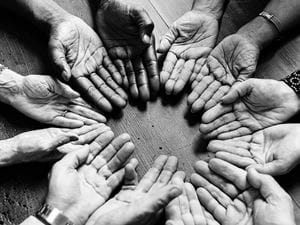
Sandeep Jauhar, New York Times bestselling author and doctor, once said "The only mistake you can make is not asking for help."
Think about that. If you are anything like me, you struggle to ask for help when you need it. It’s something a lot of humans battle with. You don't want to be a burden on others, are afraid to speak up, or want to prove you can do it yourself.
You don’t ask for help when you don’t know how to do something or can’t manage it on your own, because you might be afraid of looking stupid or incompetent. You might pretend like you know what you’re doing when you’re really drowning. Perhaps you think asking for help is a sign of weakness; that if you ask for help you’re admitting you’re inadequate in some way; that you lack knowledge, skill or experience to do something yourself. You don’t want anyone to see that you’re struggling and you want people to think that you’re in control and can handle things.
There are tons of reason you won't ask for help, but to not do so can be a mistake. You get in your own way if you make asking for help mean something negative about you when it doesn’t. Asking for help doesn’t mean you’re stupid or inadequate, it simply means you need help with something specific for a time.
Confident people often ask others for help. They do so not only because they’re secure enough to let it be known they need help, but they know that trying to do everything themselves is not always the best use of their time, skills or energy. They recognize it can leave them feeling overwhelmed and stressed and then they can’t do things properly. Confident people find someone who’s good at what they need to learn or get done and then ask for their help and guidance. They know that asking, ‘Can you help me?’ shows respect for the other person’s knowledge and abilities. Otherwise, they wouldn’t ask.
Here are some of the ways you are holding yourself back by not asking for help, and how you can overcome it.
Accepting help leads to empathy.
Your ability to seek help will allow you to be emphatic when the tables are turned. If you get the help you need now, for whatever reason, later on in life you might be able to assist in helping a friend when they need it. As we realize the strength in our ability to ask for help, let’s use the fruit of that harvest to become a blessing in the lives of others. If a friend gave you a ride one day, offer a ride to someone in your life who is in need. If your brother gave you his time as you talked through a crisis, don’t hesitate to be there for him when the time comes. Without a need for recognition or without a need for praise, freely share the generosity you have received.
They love you more than you know.
Do you hesitate to ask your friends and family for help because you don’t want to be a burden? Don’t be afraid to ask; they want to be there to help you as you have been there for them. Researchers found that we are appreciated and cared for more than we know. When asked if they perceived a peer in a positive or negative light, the descriptive adjectives people used to characterize others were overwhelmingly positive. They want to be that supportive friend for you, but you have to let them.
Everyone needs help.
Everyone will need help. From parents to presidents, everyone has needed some assistance. You don’t have to face life alone. We all have people in our lives willing to help from friends, classmates, roommates, co-workers, boyfriends, girlfriends to parents and professors. No one is alone. You are not the first, and you won’t be the last, person who needs assistance from people they love. So ask! It takes courage to admit you need help so be brave. You can do it. It might be scary, but it is worth it. It is so easy for people to down play their need for help. You don't have to brush it under the rug.
Strength comes from your vulnerability, and being able to step outside of your pride, your protective shell, your fear and say, ‘I need help.’ Strength comes from letting go of what you’ve been taught, the way you’ve been raised, the beliefs you have ingrained in your mind, and knowing that sometimes you need a friend alongside you, helping to carry those burdens that have been weighing you down for so long.
Professionals have credentials for a reason.
Sometimes you need a little guidance or a bit of advice from someone who actually knows there stuff. This can be a doctor, a therapist, a pastor, a librarian, or even a grocery store clerk. They are working in their respective jobs because they have whatever knowledge is necessary to help the company be successful. A librarian will be able to tell you where a book is, and a grocery store clerk could help you pick out a yummy meal. Doctors and therapists went to schools for a decade to be able to provide you with the care you need to be healthy. It's OK to admit that you don't know it all, because you haven't be trained in those areas. It doesn't matter how independent you are, because Google can only tell you so much.
It can be hard to ask for help when you need it the most, but at the end of the day you are doing yourself an injustice by not speaking up for yourself. There are people in your world who do genuinely care and want to offer a helping hand. You just have to put your ego aside and trust they want to.

